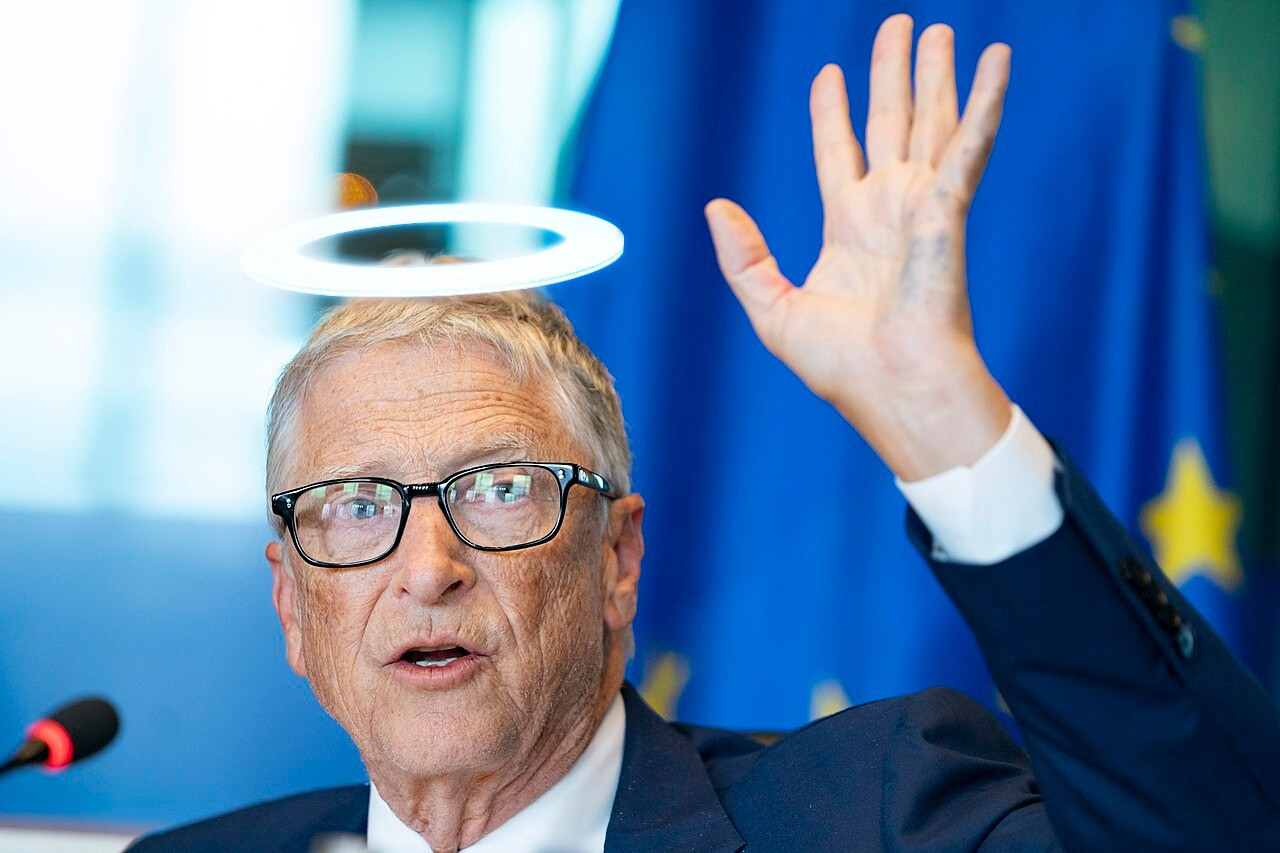When Bill Gates announced his “pivot” from climate catastrophe to humanitarian hope, the press dutifully nodded along. A messiah-complex monopolist shedding his alarmist mantle for a brighter, kinder cause.
Take a closer look, though, and you’ll see the same stage, the same spotlight, the same script—just new marketing. For decades, Gates has backed policies that punished farmers, penalized energy independence, and empowered unelected technocrats who operate far beyond democratic reach.
He invested in synthetic meat and lab-grown crops while millions of real farmers faced ruin under the weight of green regulation. He funded climate models that forecasted apocalypse, and initiatives that made energy scarce and food expensive—all under the banner of “saving the planet.”
(RELATED: Saving the Planet by Eating Fruit and Whole Grains Is Possible If You’re Dumb Enough)
Now that public trust in climate crusades is crumbling, he’s rewriting his role. The new storyline: humanity first. Less “save the Earth,” more “save the poor.” It’s a clever shift, not a retreat, but a rebrand. By recasting the mission as “human development,” Gates retains the same hierarchy: billionaires setting the agenda, governments executing it, and citizens left to applaud or adapt. The faces change, the structure doesn’t.
(RELATED: A Better Alternative To the Davos Elites)
What looks like repentance is really repositioning. The sermon has simply moved from melting ice caps to malnourished children. The congregation, weary of doom, is offered a gentler gospel—one where Gates emerges as a benevolent pragmatist rather than a panicked prophet.
Yet beneath the new tone lies the same theology: that salvation flows downward, from the billionaire to the billions. His new rhetoric sounds refreshingly modest. “Let’s stop catastrophizing, let’s focus on real improvements in living standards.”
Again, though, look closer and you’ll see that the modesty is strategic. He isn’t ceding power; he’s consolidating it. For years, his foundation’s model has relied on bypassing local governments and funneling vast sums through “partnerships” with international NGOs. The pivot doesn’t end that pattern. If anything, it perfects it.
The climate panic made him influential. The humanitarian pivot will make him indispensable.
And there’s something almost comic in the presentation. The man who told the world to eat less beef and burn less fuel now frames himself as a champion of practical prosperity. The same policies that strangled small farms and inflated food prices are now being recast as learning curves—as if the damage were a necessary prelude to wisdom. The irony is thick enough to spread on toast.
(RELATED: The Great Salad Scam)
To his credit, Gates is not wrong that poverty and disease kill far more people than carbon. But when he says so, he speaks as though the crises were separate, when in truth, one fed the other. Climate orthodoxy—the kind he financed—throttled developing nations’ access to affordable energy. It kept the poorest poor.
Now, in an act of almost biblical self-forgiveness, he presents himself as the one to lift them up again.
(RELATED: Europe’s Energy Suicide: Brussels Trades Industry for Ideology)
It’s the same savior complex with a new script. The same conviction that global order can be engineered from a Seattle office park. The same faith that the planet’s problems can be solved if only the rest of us would get out of the way.
That’s the real meaning behind the pivot.
There’s a darker side, too. When philanthropy becomes policymaking, democracy shrinks. Decisions about vaccines, food systems, and climate strategies migrate from parliaments to private foundations. No one voted for this, yet it happens anyway. Gates’ fortune makes him unaccountable, and his causes, however noble in appearance, come with no oversight.
He may preach transparency, but he governs through opacity—a king whose crown is the presumption of good intent.
The joke, if there is one, is cosmic. The man who spent years warning us that we were running out of time now assures us that everything will be fine—provided we follow his next plan.
The stage lights dim. The actor changes costume. And the audience, desperate for reassurance, claps on cue.
Meanwhile, governments that once marched to the tune of climate panic now quietly rebrand their failures as “development strategies.” Corporations that cashed in on green hysteria are pivoting, too, marketing the same control with friendlier campaigns.
The transition from fear to hope may feel fresh, but it’s still theater. The same hands still pull the strings.
So what do we do when the man with more money than many small nations becomes the moral compass of modern policy? The answer begins with skepticism. It’s not enough to ask what he funds—we must ask what he gains. Every pivot preserves his power. Every cause, however well-presented, extends his reach.
This is the paradox of Gates. His vision always sounds virtuous, but it always ends with him in charge. Climate, health, education—the topics shift, the hierarchy stays.
And now, with his latest transformation from technocrat to “humanitarian,” he is no longer selling fear but faith in himself.
—
*The Catholic Roots of America’s Horror Craze*
*The Harvard Index of Holiness*
https://spectator.org/bill-gates-and-the-redemption-racket/
